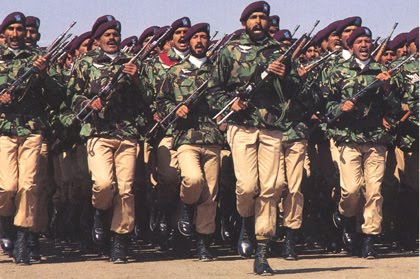PAK SSG COMMANDOS
special Service Group (SSG) is an independent commando division of the Pakistan Army. It is an elite special operations force similar to the United States Army Special Forces (Green Berets) and the British Army's SAS.Official numbers are put at 2,100 men, in 3 Battalions; however the actual strength is classified. It is estimated to have been increased to 4 Battalions, with the eventual formation of 2 Brigades of Special Forces (6 Battalions). According to Indian analyst, Mandeep Singh Bajwa, the SSG "are formidable opponents and easily rank as one of the finest special forces in the world."
Based out of Cherat and Attock, the SSG was created in 1956 with active support from U.S. Special Operations Forces. That year the 19th Battalion of the Baloch Regiment (19 Baloch) was selected for conversion to a Special Operation Force. As a result of this, the SSG has inherited many of the traditions and insignia of the Baloch regiment. Their first CO was Lt. Col. (later Maj. Gen.) Abu Bakr Osman Mitha who commanded it for six years till 1963. and the first Officer Commanding of its Alpha Company was Major Gaideen Khan Abdullai Mahsud (Later Lt Col). Their initial training and orientation as regards tactics was based on the US Special Forces pattern with whom they co-operated closely in the Cold War years. The SSG initially had 6 companies and each company had specialization units, specialized in desert, mountain, ranger, and underwater warfare. The desert companies participated in training exercises with US Army Special Forces Mobile Training Team in late 1964. The scuba company in Karachi was renowned for its tough physical training. Later on Chinese training, tactics, weapons, and equipment were also introduced.
The SSG were initially deployed along the Afghan border to repel Afghan incursions into Pakistan but the first major deployment came during the war of 1965.
Around 100 officers and men were dropped on the night of 6/7 September near the Indian airbases of Adampur, Pathankot and Halwara in an ill-conceived operation to destroy Indian combat aircraft and put the bases out of action. Badly planned, lacking any solid intelligence, and even more badly executed the operation ended in a disaster. Only a handful made it back to Pakistan and no Indian planes were damaged or casualties inflicted on Indian troops. By 1971, the SSG had grown to 3 Battalions with 1 permanently stationed in East Pakistan (Bangladesh). The performance of the SSG in the 1971 was much better with 1 Commando Battalion making a spectacular raid on an Indian artillery regiment and disabling several of their guns besides inflicting casualties.
During the Soviet war in Afghanistan, the SSG deployed there, disguised as Afghans and provided support to the Mujahideen fighting the Soviets. Author Aukai Collins, in the book 'My Jihad,' gave the Pakistani infiltrators the title 'Black Storks. They appear to have engaged the Soviet Airborne Forces in major battles such as the January 1988 Battle for Hill 3234 in which the Russians lost six men. Another battle sometimes reported as having been fought between the Pakistanis and Soviet troops, in Kunar Province in March 1986, appears to have actually been fought between the GRU Spetsnaz's 15th Spetsnaz Brigade, and the Asama Bin Zaid regiment of Afghan mujahideen under Commander Assadullah, belonging to Abdul Rasul Sayyaf's faction.
The SSG were also active on their eastern border with India and fought well in Siachen though in one or two instances taking heavy casualties. In the preliminary stages of the 1999 Kargil Operations the SSG performed well, infiltrating relatively deep into Indian territory undetected and subsequently were used as stock infantry troops to hold posts/defensive positions. In 1980, the SSG's Musa Company, which was originally formed in 1970 as a combat diver unit, was given the anti-terrorist operations role. Musa Company got the best founders in the beginning like Major Faiz Akbar Shah and Captain Sajjad Ali Shah. They were UDT/Seals qualified from class 79 of American Navy Seals. Captain Sajjad, who later retired as a Leutenant Colonel was a salvage expert and had the intensive training of under water demolution. Musa Company was trained by British SAS advisers in mid-1981. Recently, SSG has been active in anti-terrorist operations in Pakistan's restive western borders with Afghanistan and fighting Islamic extremists in Pakistani cities such as the Lal Masjid siege.
Now PAK SSG gives training to girls commandos also
.jpg)



.jpg)



No comments:
Post a Comment